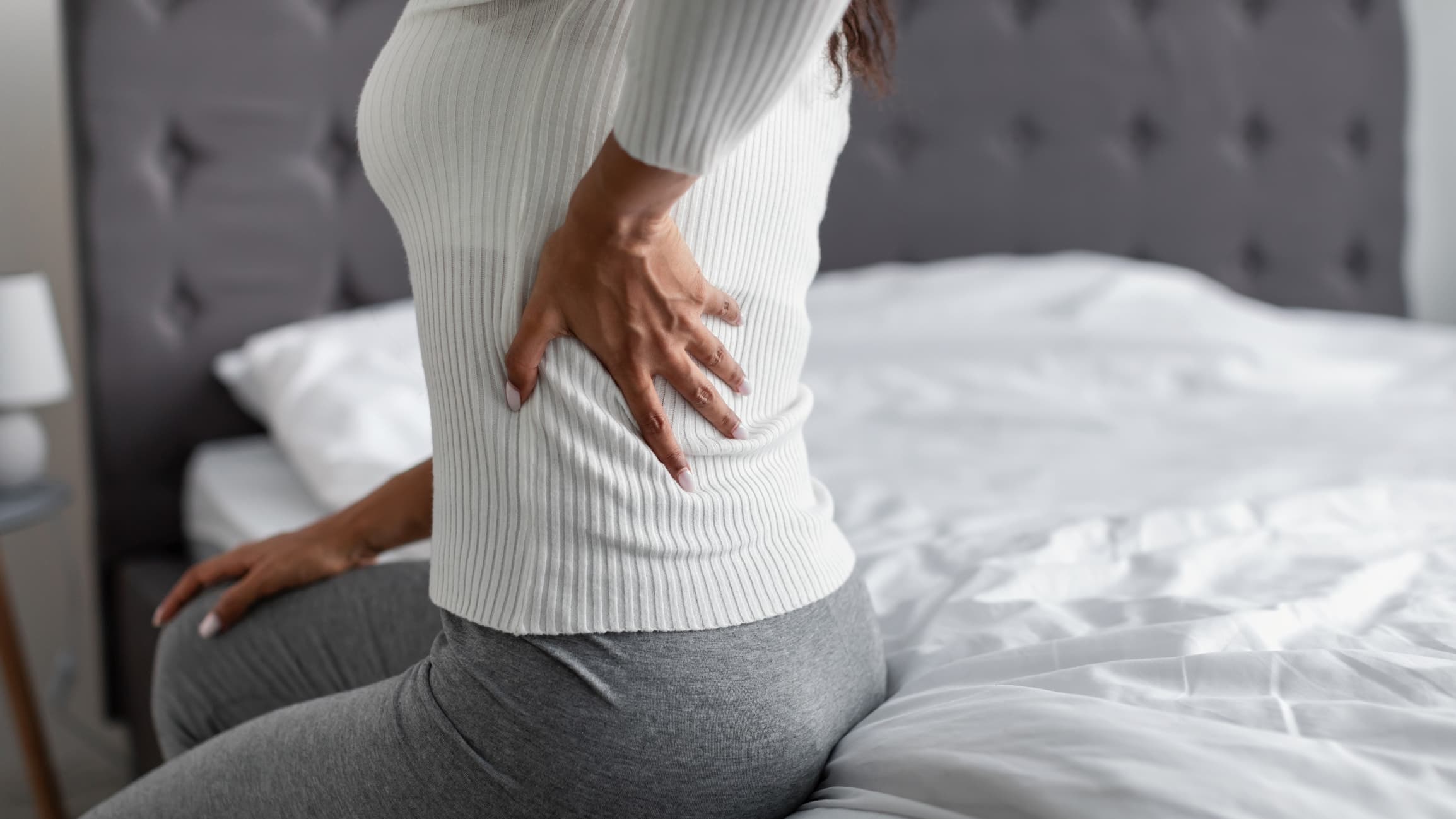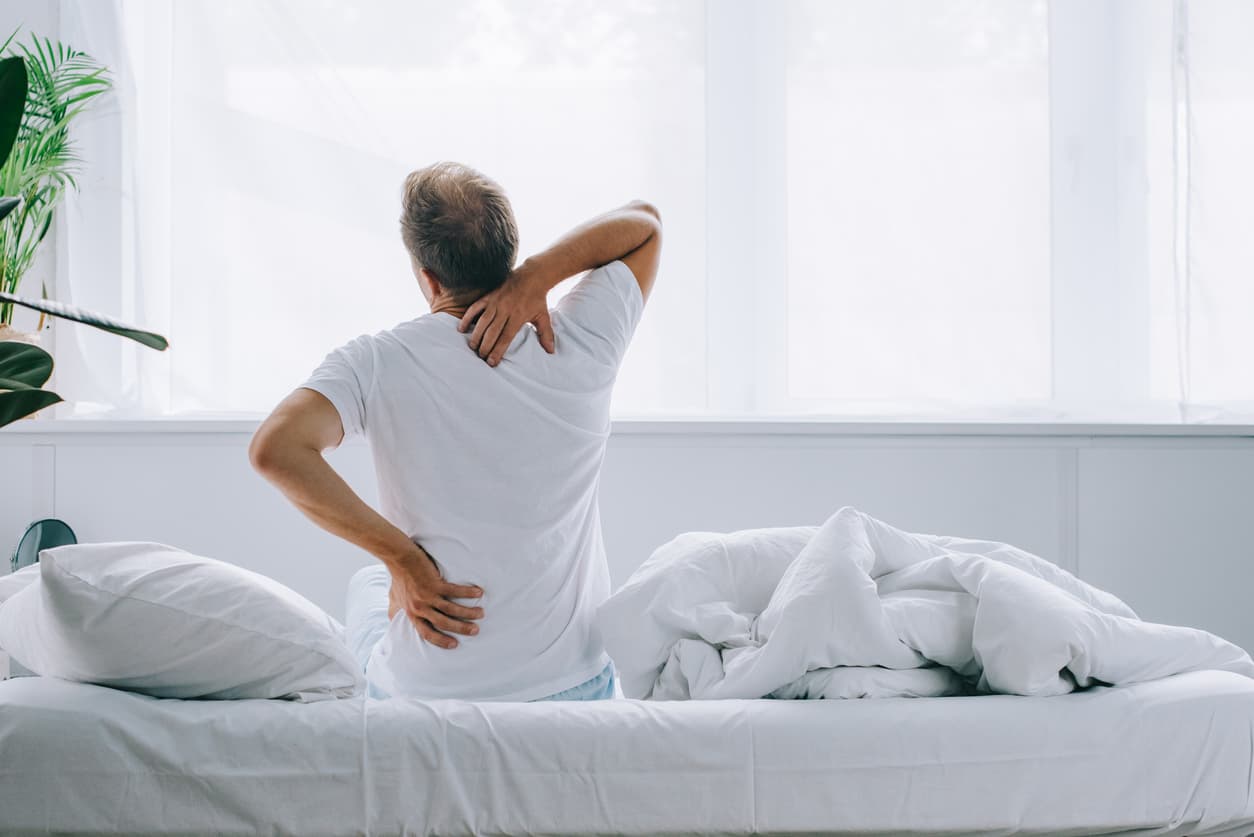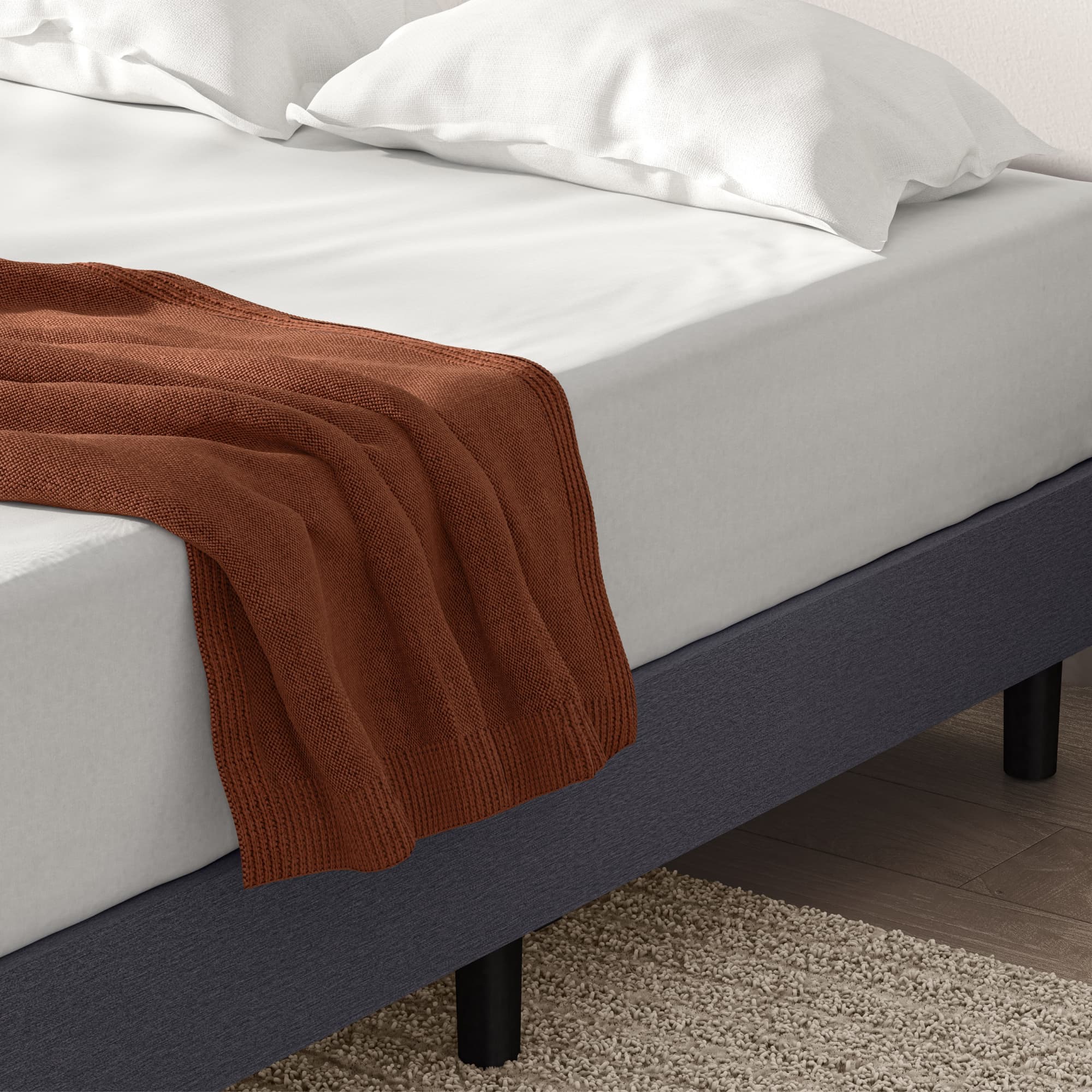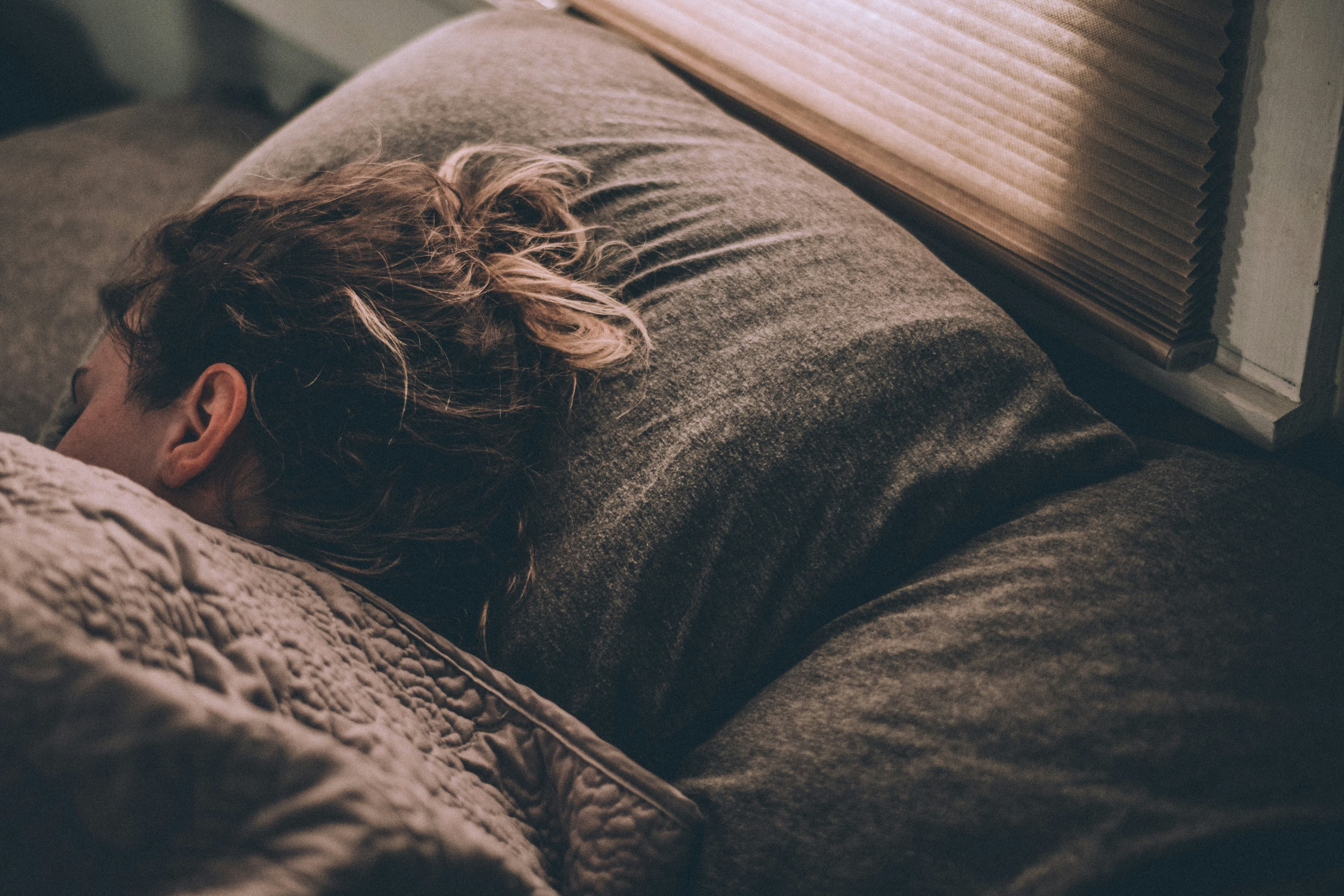If you’re struggling with back pain, you’re not alone. Roughly 8 percent of all adults live with either chronic or recurring back pain. Whether your back pain is mostly in your neck (cervical), mid-back (thoracic), or lower (lumbar) region, you may notice you’re taking more time off work, reducing your physical activity, and generally experiencing a lower quality of life due to the issue.
This isn’t uncommon. Unfortunately, sometimes doctors can’t pinpoint the exact cause of a patient’s back pain. This is, of course, frustrating for the patient as well as the doctor. If you’re struggling to find the root cause of your back pain, consider your mattress. Yes, that’s right—your mattress can cause back pain, especially if it’s too firm or too soft.
In fact, a poor-quality mattress is a common cause of back pain. Recent studies show that a new mattress may alleviate chronic pain under certain conditions. In this guide, we’ll explain the common causes of mattress-related back pain, how to tell if your mattress is causing your back pain, and how to find relief.
Why do mattresses cause back pain?
Most people sleep at least seven or eight hours every night. That’s about one-third of your life, and the hours quickly add up. If your mattress causes discomfort, there’s probably a reason.
Maybe your mattress doesn’t support your spine. This can gradually cause your spine to shift, creating disc issues or general aches and pains. Without proper support, your muscles may be forced to work much harder than they should, trying to hold your spine in proper alignment throughout the night.
When you think about it, your mattress is probably the most important piece of furniture in your home. You spend much more time using your bed than you probably realize.
How can you tell if your mattress is causing back pain?
If you’re experiencing back pain, you’re probably wondering how you can tell if it’s your mattress or something else. The truth is that a new mattress may help your back pain, even if your current mattress isn’t necessarily the cause.
If your mattress is old or worn out, consider replacing it with a more comfortable, newer mattress that supports your body. If your mattress is new, though, there are ways to tell if your mattress is causing your back pain.
1. Are you sleeping well?
If you're sleeping soundly through the night, your mattress may not be the problem. However, if you regularly toss and turn or wake up feeling uncomfortable, consider trying a new mattress. Your current mattress may be too firm or too soft for a good night’s rest.
2. Does your back hurt in the morning?
If your mattress is causing your back pain, you’ll probably feel worse when you first wake up. In fact, your back pain may be at its peak when you roll out of bed, then get better as the day progresses. That’s a strong indication that your mattress is the culprit.
3. Are you rolling towards the center of your mattress?
A good mattress provides adequate support. An old, soft mattress may not support you as you sleep. You might even feel like you’re rolling towards the center of the bed or sleeping in a hollow space. There’s a very good chance you’ll wake up feeling achy, too. If this sounds familiar, please invest in a new mattress for the sake of your health.
4. Is your mattress brand new?
Sometimes it takes a little while to “break-in” a new mattress. If you just purchased a new mattress and it feels too firm, give it a few weeks. If it still feels uncomfortable, it may be time to return it for a softer mattress.
5. Are you uncomfortable when you lie down?
Usually, you’ll be able to tell if your mattress is uncomfortable. You may have gradually adjusted to your mattress as it aged, but try lying on it for a few moments to gauge its comfort. Does your body feel entirely supported? Do you tense your muscles to maintain a comfortable posture? Do you feel yourself rolling or pulling towards the center of the mattress? Could you easily fall asleep in any position? If your mattress isn’t comfortable when you’re awake, it’s probably not any better while you’re asleep. It’s probably time for a new one.
How to Find a Mattress That Relieves Your Back Pain
If you’ve decided that your mattress may be the primary reason for your back pain, don’t worry. This is an incredibly common problem, but it’s easy to fix. The first step, of course, is to find a new mattress. That may sound like it’s easier said than done, but this guide will help. There are ways to ensure you’re purchasing the best mattress for your back pain, wherever it may be.
1. Your mattress should be comfortable.
First, find a mattress that feels comfortable when you lie on it. You can test-drive a few mattresses in-store to find one that’s supportive but also plush. This may not be enough to completely relieve your back pain, but it’s a great way to start your search. Leesa offers a 120-night risk-free trial as well so you can actually take your mattress for a real-life test drive rather than making a decision based on hopping from mattress to mattress for a minute at a time.
2. Science says medium-firm mattresses are best.
Every spine is different, but most studies indicate that medium-firm mattresses are best for relieving back pain. One study found that medium-firm mattresses with layers of foam helped relieve participants’ low back and shoulder pain. In another study , researchers discovered that medium-firm mattresses effectively improved non-specific low back pain. If you’re not sure where to start, it seems that middle-of-the-road is best when it comes to firmness.
3. Consider a hybrid mattress.
Foam or latex? Innerspring or hybrid? The truth is that mattresses aren’t a one-size-fits-all piece of furniture. Some people may find that foam relieves their back pain, while others believe an innerspring mattress gives them the best support.
The good news is that hybrid mattresses seem to work well for most of us. These combine the comfort of a plush foam mattress with the support of individually wrapped springs and provide comfortable sleep regardless of sleep position.
Final Thoughts
While nothing compares with actually using your mattress, if you’re looking for a new sleep surface that supports your spine and alleviates back pain, these tips will help. Beyond that, we recommend trying a few different mattresses to find one that provides comfort as you sleep.
Ready to start your search? You can use Leesa’s comparison shopper to find the perfect mattress for your spine health.
FAQs
How do I know if my mattress is causing my back pain?
It’s usually pretty easy to tell. If you’re consistently waking up tired or have trouble sleeping through the night, your mattress may be to blame. If you also have chronic back pain, a new mattress may be the answer.
How do you relieve back pain from a mattress?
Usually, the answer is simple: You need a new mattress. You might be able to get by with a new mattress topper for a while, but eventually, your old mattress will need complete replacement.
Which type of mattress is best for back pain?
The right mattress depends on a lot of factors. If you’re a side sleeper, you might need a different type of mattress than a back sleeper. The best advice is to go mattress shopping and find out for yourself! Try a firm mattress, a very firm mattress, latex mattresses, and a memory foam mattress among all the other choices.
Be sure to try them in your regular sleep position. If you're having doubts, trust that you'll know a bad mattress from a good mattress, and you'll finally find the perfect mattress. If you're short on time, a medium-firm density hybrid mattress is generally a safe bet.
How do I know if my mattress is bad?
Does it sag? Is it older than 8 years or so? Is it uncomfortable? Do you roll to the middle of it while you sleep? Is it wrinkled, lumpy, or uneven? All of these signs indicate that your mattress needs replacement. When you find a properly supportive mattress, you'll not only relieve pain and get pressure relief, you'll also get a good night's sleep.



